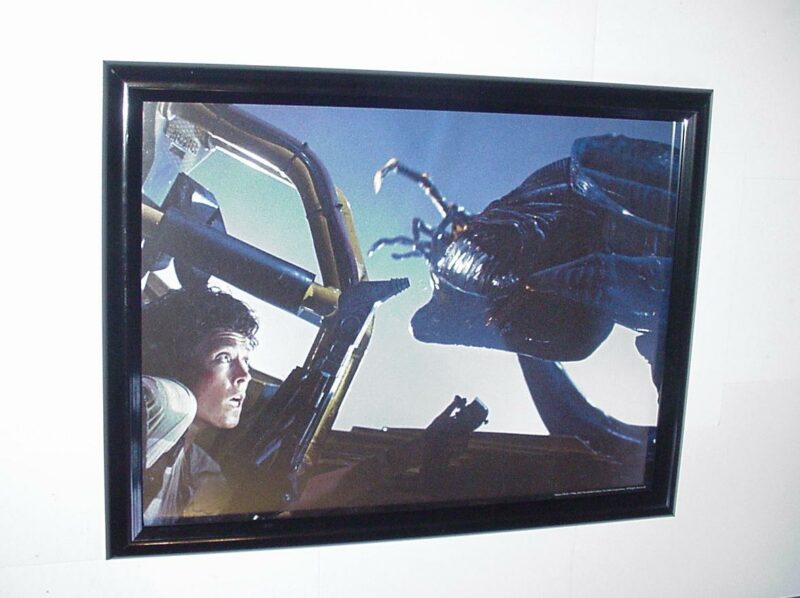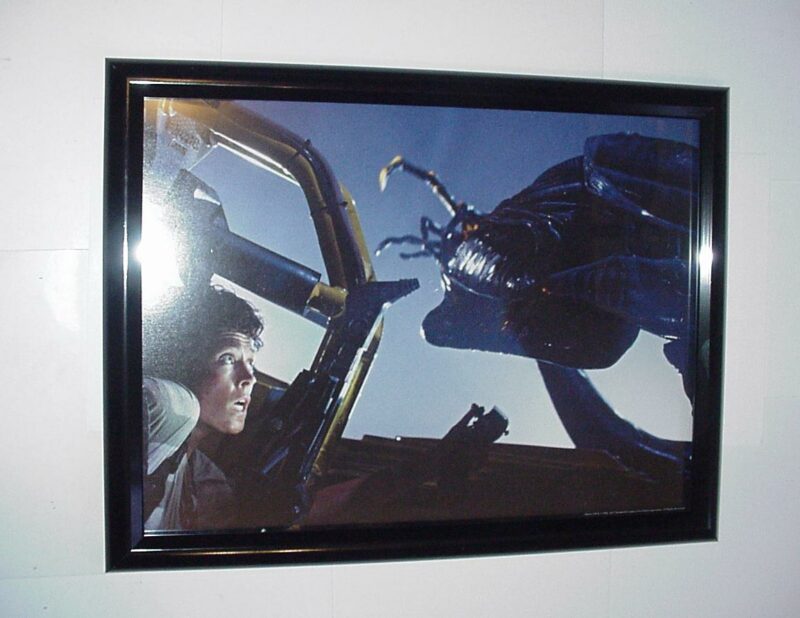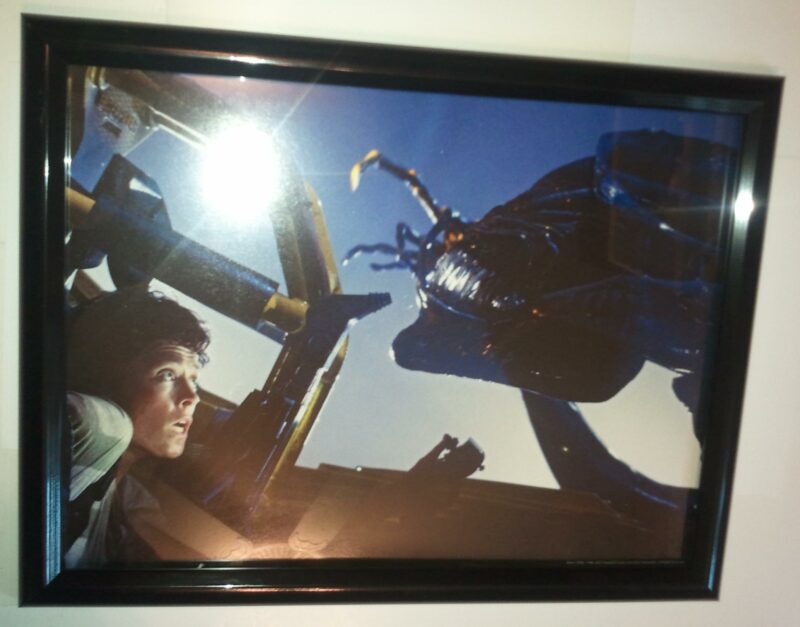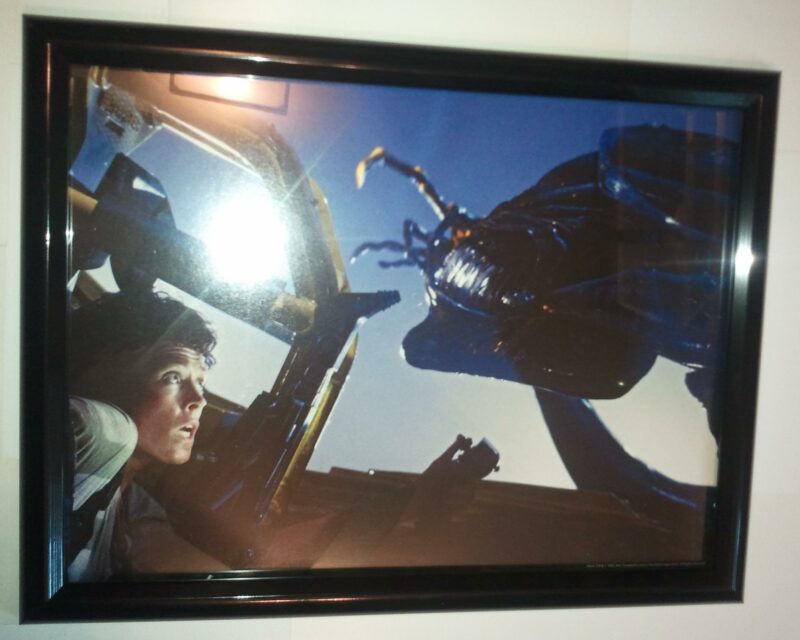Aliens Poster #16 FRAMED Ripley vs Queen Sigourney Weaver James Cameron
$74.99
Description
Ellen Ripley in the Power Loader she uses to battle the Alien Queen.
Aliens is a 1986 American science-fiction action horror film written and directed by James Cameron, produced by his then-wife Gale Anne Hurd, and starring Sigourney Weaver, Carrie Henn, Michael Biehn, Paul Reiser, Lance Henriksen, William Hope, and Bill Paxton. It is the sequel to the 1979 film Alien and the second installment of the Alien franchise. The film follows Weaver’s character Ellen Ripley as she returns to the planet where her crew encountered the hostile Alien creature, this time accompanied by a unit of space marines.
Brandywine Productions was interested in a follow-up to Alien as soon as its 1979 release, but the new management at 20th Century Fox postponed those plans until 1983. That year Brandywine picked Cameron to write after reading his script for The Terminator, and once that film became a hit in 1984, Fox greenlit Aliens, that would also be directed by Cameron, with a budget of approximately $18 million. The script was written with a war film tone influenced by the Vietnam War to contrast the horror motifs of the original Alien. It was filmed in England at Pinewood Studios and at a decommissioned power plant in Acton, London.
Aliens was a critical and commercial success, with positive reviews that considered it an entertaining film that despite the tonal shift still served as a worthy sequel to Alien, and grossed $180 million worldwide. The movie was nominated for seven Academy Awards, including a Best Actress nomination for Sigourney Weaver, winning both Sound Effects Editing and Visual Effects. It won eight Saturn Awards, including Best Science Fiction Film, Best Actress for Weaver and Best Direction and Best Writing for Cameron. Aliens is frequently considered one of the best action films ever released.
Aliens was nominated for seven Academy Awards including Best Music, Best Sound, Best Film Editing, and Best Art Direction/Set Decoration. It won two awards for Sound Effects Editing and Visual Effects. Sigourney Weaver received her first Academy Award nomination for Best Actress, and although she did not win, it was considered a landmark nomination for an actress to be considered for a science fiction/horror film, a genre which was given little recognition by the Academy in 1986.
Practical effects supervisor John Richardson declared his biggest challenge was creating the forklift Power Loader exoskeletons, which required only three months of work and had Cameron complaining about visual details during construction. The model could not stand on its own, requiring either wires dangling from the shoulders or a pole through the back attached to a crane. While Sigourney Weaver was inside the power loadermodel, a stunt man standing behind it would move the arms and legs.
Aside from the Alien Queen, designed by Cameron himself, the Aliens still took inspiration off H. R. Giger’s designs for the original. The only change was removing the translucent dome that gave the creature’s head its sleek shape in Alien, exposing the ridged, spined cranium beneath. Cameron felt the dome was too fragile for the practical effects, and also felt that the cranium design was more visually interesting without it.
Scenes involving the Alien queen were the most difficult to film, according to production staff. A life-sized mock-up was created by Stan Winston’s company in the United States to see how it would operate. Once the testing was complete, the crew working on the queen flew to England and began work creating the final version. Standing at 14 feet tall, it was operated using a mixture of puppeteers, control rods, hydraulics, cables, and a crane above to support it. Two puppeteers were inside the suit operating its arms, and sixteen were required to move it. All sequences involving the full size queen were filmed in-camera with no post-production manipulation. Additionally, a miniature alien queen was used for certain shots.
Queen Aliens are significantly larger and stronger than the normal adults, being approximately 15 ft tall. Their body structure differs also, having two pairs of arms, one large and one small. The queen’s head is larger than those of other adult Aliens, male and female, and is protected by a large, flat crest, like a crown, which varies from queen to queen. In the second film Aliens, unlike other adults and queens, the queen had high-heel protrusions from her feet.
Egg-laying Alien queens possess an immense ovipositor attached to their lower torso, similar to a queen termite’s. Unlike insect queens, there appears to be no need for an Alien queen’s eggs to be fertilized. When attached to her ovipositor, the queen is supported by a “biomechanical throne” that consists of a lattice of struts resembling massive insect legs.
In the original cut of Alien, the Alien possessed a complete lifecycle, with the still-living bodies of its victims converted into eggs. However, the scene showing the crew converted into eggs was cut for reasons of pacing, leaving the ultimate origin of the eggs obscure. This allowed Aliens director James Cameron to introduce a concept he had initially conceived for a spec script called Mother, a massive mother Alien Queen which laid eggs and formed the basis for the Aliens’ life cycle. Cameron conceived the Queen as a monstrous analogue to Ripley’s own maternal role in the film. In that vein, some critics have compared it to Grendel’s mother.
The design of the queen was created by Cameron in collaboration with special effects artist Stan Winston, based upon an initial painting Cameron had done at the start of the project. The Winston Studio created a test foam core queen before constructing the full hydraulic puppet which was used for most of the scenes involving the large Alien. Two people were inside working the twin sets of arms and puppeteers off-screen worked its jaws and head. Although at the end of the film the queen was presented full-body fighting the power-loader, the audience never sees the legs of the queen, save those of the small-scale puppet that appears only briefly. In Aliens, Cameron used very selective camera-angles on the queen, using the ‘less is more’ style of photography. Subsequently the movie won an Oscar for Visual Effects. An adult queen was to reappear in Alien Resurrection. The original mechanical head previously used in Aliens was provided by Bob Burns, and was an altered design. It was repainted with a blend of green and brown, giving it a shimmering, insect-like quality. This color concept would be abandoned in Alien versus Predator in favour of the original black color scheme.
In the climax of the 2004 film Alien vs. Predator the queen’s basic design was altered to make her more “streamlined” in appearance and her over-all size was increased to 6 meters (20 feet) tall. Other changes include the removal of the “high-heel” protrusions on her legs, including additional spines on her head and making her waist thinner because there was no need for puppeteers inside her chest. The animatronic queen had 47 points of hydraulic motion.
Ellen Louise Ripley is a fictional character and the protagonist of the Alien film series played by American actress Sigourney Weaver. She is often considered as one of the best female protagonists of all time: it was heralded for challenging gender roles, particularly in the science fiction, action and horror genres, gave world recognition to Weaver and remains her most famous role to date.
She has been included in many Best Characters lists: In 2011, Total Film ranked her first of their top 100 Greatest Female Characters. Ripley has been selected as the eighth-greatest hero in American cinema history by the American Film Institute, as the fifth-coolest hero in pop culture by Entertainment Weekly, the ninth-greatest movie character ever by Empire (the highest-placing female of the list), and the eighth-best movie character of all time by Premiere, In 2011, John Scalzi called her “Clearly the Best Female Character in Scifi Film”.
Weaver’s performances have been highly praised as well: for Aliens, she earned her first Academy Award nomination for the Best Actress, which is now seen as a landmark in the recognition of science fiction, action, and horror, at a time when the Academy gave little recognition to such genres. For her role in the franchise, Weaver has also been nominated for a Golden Globe Award for Best Actress in a Motion Picture Drama, a BAFTA Award for Best Leading Newcomer, and four Saturn Awards for Best Actress, winning one for Aliens.
Ripley also appeared in various other media, including novels, comic books, and video games. In 2014, Weaver reprised her role as Ripley (alongside most of the original cast) for the video game Alien: Isolation, in two DLCs set during the events of Alien.
For her performance in Alien, Weaver was nominated for a BAFTA Award for Best Leading Newcomer and a Saturn Award for Best Actress.
Although her performance had already been acclaimed in the first film, Aliens gave worldwide recognition to Weaver: she was the second horror actress in history (after Ellen Burstyn for The Exorcist) to be nominated for an Academy Award for Best Actress. She also received a nomination for the Golden Globe Award for Best Actress – Motion Picture Drama, and won the Saturn Award for Best Actress, the first award in her career (except a minor award, the Mystfest Award for Best Actress, won for Half Moon Street).
Sigourney Weaver (born Susan Alexandra Weaver; October 8, 1949) is an American actress. She is known especially for the lead role of Ellen Ripley in the four Alien films: Alien, Aliens, Alien 3 and Alien Resurrection. She is also well known for her roles in Ghostbusters and Ghostbusters II, Gorillas in the Mist, Working Girl, and Avatar.
Her 1986 Academy Award nomination for Aliens is considered as a landmark in the recognition of science fiction, action, and horror genres, as well as a major step in challenging the gender role in cinema. Weaver progressively received fame for her numerous contributions to the science fiction film history (including minor roles in successful works such as Futurama, WALL-E, Paul and The Cabin in the Woods) and gained the nickname of “The Sci-Fi Queen”. She also played the lead role as Secretary of State Elaine Barrish on USA Network’s Political Animals miniseries.
Weaver has been nominated for three Academy Awards: Best Actress for Aliens and Gorillas in the Mist: The Story of Dian Fossey, and Best Supporting Actress for Working Girl. She also won a BAFTA Award for Best Actress in a Supporting Role for The Ice Storm, and Saturn Awards for Aliens and Avatar. She also earned Emmy Award, Drama Desk Award and Tony Award nominations. She has been nominated for seven Golden Globe Awards and won both Best Actress in Drama and Best Supporting Actress in 1988 for Gorillas in the Mist and Working Girl, becoming the first person ever to have won two acting Golden Globe Awards in the same year.
Warrant Officer/Lieutenant Ellen Ripley in Ridley Scott’s blockbuster 1979 film Alien, in a role initially designated to co-star Veronica Cartwright, until a late change in casting. She reprised the role in the three sequels of the Alien movie franchise, Aliens, Alien 3, and Alien Resurrection. Ty Burr of The Boston Globe states, “One of the real pleasures of “Alien” is to watch the emergence of both Ellen Ripley as a character and Sigourney Weaver as a star.” In the sequel Aliens directed by James Cameron, critic Roger Ebert writes, “Weaver, who is onscreen almost all the time, comes through with a very strong, sympathetic performance: She’s the thread that holds everything together.” Weaver followed the success of Alien appearing opposite Mel Gibson in The Year of Living Dangerously released to critical acclaim and as Dana Barrett in Ghostbusters and Ghostbusters II.
Frame is shrinkwrapped until time of purchase. Ships boxed with packing peanuts.
THE PERFECT GIFT!
Related products
-
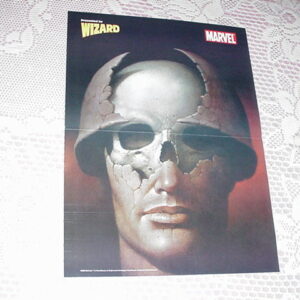
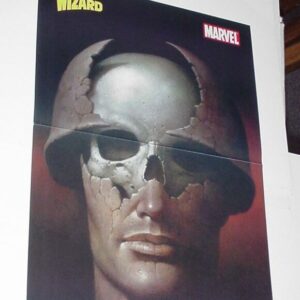
Punisher Poster # 6 by Wieslaw Walkuski Born Frank Castle Origin Movie
$29.99 Add to cart -

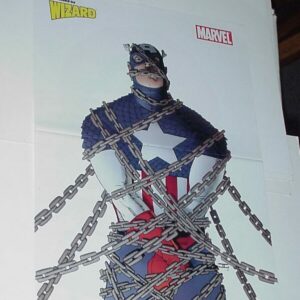
Captain America Poster # 9 In Chains by John Cassaday Issue 8
$29.99 Add to cart -

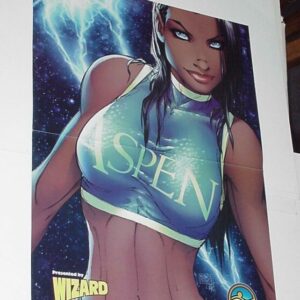
Fathom Poster # 9 Aspen Shirt Michael Turner Matthews Superman
$39.99 Add to cart -


Magdelena Poster Joe Michael Linsner Dawn
$34.99 Add to cart
